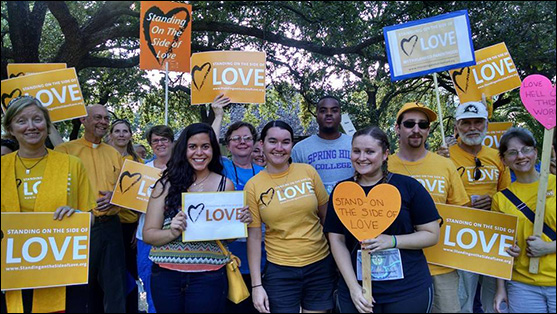
All are welcome, to a point
Anti-abortion activists interrupted a Unitarian Universalist worship service, then complained when they were ushered out.
In the middle of a quiet moment of prayer and meditation, Deanna Waller, a member of the anti-abortion group Operation Save America, stood up and began hurling verbal assaults at the congregation. Others joined her, yelling that the church was not a “true faith,” exhorting members to “repent.” Vandiver, a UU minister and the executive director of the Center for Ethical Living and Social Justice Renewal, asked Waller and her fellow interlopers to leave the sanctuary if they could not participate respectfully. Waller retorted, “But you said all are welcome here. You said ALL are welcome.” Vandiver replied, “You are welcome here, if you can worship with us respectfully. If you cannot be respectful, you are respectfully invited outside the threshold of this sanctuary.”
We Unitarian Universalists spend lots of time trying to figure out who we are, spend time trying to craft the perfect “elevator speech” to describe ourselves. But in my experience, when it comes to some of the most ethically complex “wedge” issues of our time, we know exactly where we stand and what to say. For a religious community that has used the bumper sticker slogan “Room for Different Beliefs—Yours,” we Unitarian Universalists share a great deal. Our morality, our shared beliefs about right and wrong, bring us together as a religious community. And because we share core values, we have boundaries and borders. We have thresholds that define how what happens in our churches is different than what happens outside of our churches. We are a particular people with a particular history who share particular beliefs.
And one of those core values is our respect for the conscience of each person—of each woman—in the context of her community.
Our particularity is why my grandparents’ UU church in Rochester, New York, gave Planned Parenthood its first home in the 1950s. Our particularity is why the women’s group at First Unitarian Church of Dallas helped initiate the Roe v. Wade legal case. Our particularity is why First UU Church of New Orleans hosted the groundbreaking ceremony for a new Planned Parenthood being built down the road. And it’s our particularity that drew the loud, grotesque, and intrusive attentions of Operation Save America.
Reviewing the headlines from coverage of that July Sunday morning, you will find the verbs “disrupted,” “violated,” “harassed,” “invaded,” and “interrupted.” I don’t know about you, but reading these headlines, thinking about experiences of disruption, violation, harassment, invasion, interruption, makes me want to curl inward, arms across my chest. I want to protect. I want to be protected. Too many of us have experienced violation in our lives. We know that in order to heal, people often do need a place and need time to curl up. But once we recover, as so many of us do (what a miracle human resiliency is!), we must unfurl ourselves and risk reaching back out. Our religious tradition teaches that we humans find true safety not by turning away and closing off but, in the words of the Rev. Deanna Vandiver, by “sticking together and standing up for one another.”
Because of painful histories of exclusion, bigotry, and violence, many of us religious liberals feel intense discomfort at admitting that we are not a church where “you can believe anything you want”—a description I have heard too many times in my lifetime as a Unitarian Universalist. What happened on July 20 at First UU Church of New Orleans shows why we feel so uncomfortable—why we may feel scared to admit that, in fact, not “all are welcome” in our churches. Because once you take a clear stand on something, others will disagree; they may attack. But we are a strong people. We have resources to help us respond to such attacks with grace, wisdom, and compassion. We have the resources and wisdom to say, with respect, “You are welcome to your beliefs and behaviors. Now please take them outside the threshold of our church.”
Just as New Orleans Planned Parenthood needed a sanctuary the day of their groundbreaking celebration, many progressive people—especially people committed to women’s reproductive rights and to the cause of reproductive justice—need a spiritual sanctuary that affirms their work as morally good, religiously grounded, and radically compassionate. May our congregations be places of such sanctuary and radical affirmation.
Photograph (above): Unitarian Universalists from New Orleans gather in support of women’s reproductive rights and LGBTQ rights in July 2014 (Leslie Runnels). See sidebar for links to related resources.
Comments powered by Disqus






